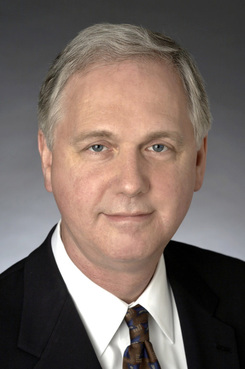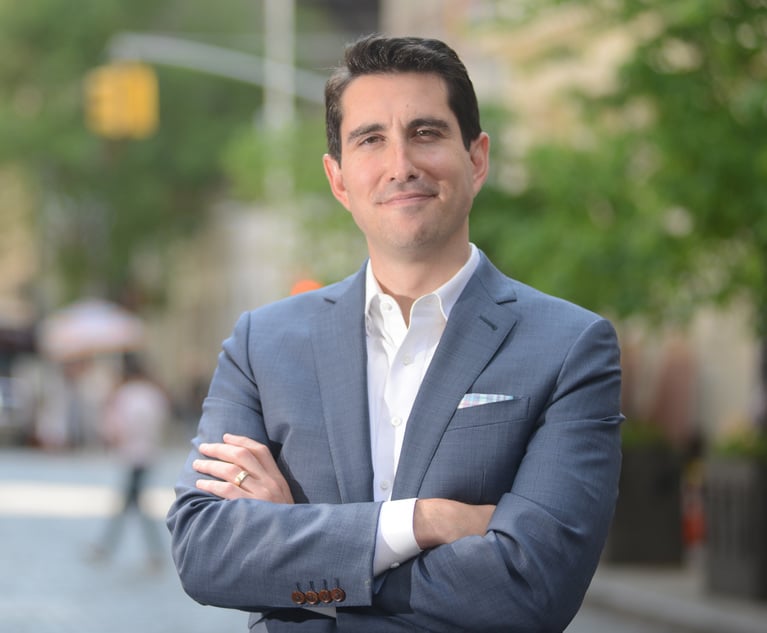Former Wells Fargo GC Vows to Fight New Charges in Sham-Account Scandal
Former Wells Fargo general counsel James Strother's lawyer, Walt Brown at Orrick, Herrington & Sutcliffe, said that the Office of the Comptroller of the Currency's charges seeking a $5 million civil money penalty were "false and unfounded, and he intends to vigorously defend against them."
January 23, 2020 at 04:33 PM
3 minute read
 Wells Fargo Atlanta HQ.
Wells Fargo Atlanta HQ.
Lawyers for former Wells Fargo & Co. general counsel James Strother have vowed to fight new charges from the Office of the Comptroller of the Currency related to the bank's fake account scandal.
The OCC announced charges Thursday against Strother and four other former executives, including former CEO John Stumpf who agreed to pay $17.5 million and to be barred from participating in the banking industry. The firm's former chief administrative officer and chief risk officer also settled with the agency, agreeing to pay a combined $3.5 million.
Strother's lawyer, Walt Brown of Orrick, Herrington & Sutcliffe, however, said in an email statement that the OCC's allegations against his client are "false and unfounded, and he intends to vigorously defend against them."
 James Strother.
James Strother.Strother's name is mentioned 113 times in the unredacted portions of the 100-page charging document filed by the OCC on Thursday. According to the OCC, Strother oversaw a legal department that was aware that over-aggressive sales goals within Wells Fargo's consumer bank were leading employees to open unauthorized accounts in customers' names.
"Respondent Strother and the law department he supervised were aware of the longstanding sales practices misconduct problem and did nothing meaningful to address it," the OCC filing says. "Instead, respondent Strother and the law department were instrumental in maintaining the Community Bank's business model that resulted in rampant criminal and legal violations." The OCC is seeking a $5 million civil monetary penalty from Strother as well as a personal cease and desist order, which could force him to take certain actions or promise to refrain from other activities in order to be involved in the banking industry going forward.
A 2017 report from the law firm Shearman & Sterling, which conducted an internal investigation of the bank's sham account scandal, found that Strother's legal department failed to grapple with the gravity of the threats facing the bank.
"The law department's focus was principally on quantifiable monetary costs—damages, fines, penalties, restitution," the Shearman report said. "Confident those costs would be relatively modest, the law department did not appreciate that sales integrity issues reflected a systemic breakdown in Wells Fargo's culture and values and an ongoing failure to correct the widespread breaches of trust in the misuse of customers' personal data and financial information."
Brown, Strother's lawyer at Orrick, said Thursday his client had dedicated more than 30 years to the bank. "He steered Wells Fargo through historic and unprecedented legal and regulatory issues, earning the trust of all those around him," Brown said. "At all times, Mr. Strother acted with the utmost integrity and transparency, including with the bank's board, senior management, and its regulators."
Read more:
Wells Fargo GC Allen Parker Helps Restore Integrity to Embattled Financial Giant
Report Faults Wells Fargo's Law Department in Sham-Accounts Scandal
This content has been archived. It is available through our partners, LexisNexis® and Bloomberg Law.
To view this content, please continue to their sites.
Not a Lexis Subscriber?
Subscribe Now
Not a Bloomberg Law Subscriber?
Subscribe Now
NOT FOR REPRINT
© 2025 ALM Global, LLC, All Rights Reserved. Request academic re-use from www.copyright.com. All other uses, submit a request to [email protected]. For more information visit Asset & Logo Licensing.
You Might Like
View All
Kraken’s Chief Legal Officer Exits, Eyes Role in Trump Administration
3 minute read

Collectible Maker Funko Wins Motion to Dismiss Securities Class Action

How Tony West Used Transparency to Reform Uber's Toxic Culture
Trending Stories
- 1California Court Denies Apple's Motion to Strike Allegations in Gender Bias Class Action
- 2US DOJ Threatens to Prosecute Local Officials Who Don't Aid Immigration Enforcement
- 3Kirkland Is Entering a New Market. Will Its Rates Get a Warm Welcome?
- 4African Law Firm Investigated Over ‘AI-Generated’ Case References
- 5Gen AI and Associate Legal Writing: Davis Wright Tremaine's New Training Model
Who Got The Work
J. Brugh Lower of Gibbons has entered an appearance for industrial equipment supplier Devco Corporation in a pending trademark infringement lawsuit. The suit, accusing the defendant of selling knock-off Graco products, was filed Dec. 18 in New Jersey District Court by Rivkin Radler on behalf of Graco Inc. and Graco Minnesota. The case, assigned to U.S. District Judge Zahid N. Quraishi, is 3:24-cv-11294, Graco Inc. et al v. Devco Corporation.
Who Got The Work
Rebecca Maller-Stein and Kent A. Yalowitz of Arnold & Porter Kaye Scholer have entered their appearances for Hanaco Venture Capital and its executives, Lior Prosor and David Frankel, in a pending securities lawsuit. The action, filed on Dec. 24 in New York Southern District Court by Zell, Aron & Co. on behalf of Goldeneye Advisors, accuses the defendants of negligently and fraudulently managing the plaintiff's $1 million investment. The case, assigned to U.S. District Judge Vernon S. Broderick, is 1:24-cv-09918, Goldeneye Advisors, LLC v. Hanaco Venture Capital, Ltd. et al.
Who Got The Work
Attorneys from A&O Shearman has stepped in as defense counsel for Toronto-Dominion Bank and other defendants in a pending securities class action. The suit, filed Dec. 11 in New York Southern District Court by Bleichmar Fonti & Auld, accuses the defendants of concealing the bank's 'pervasive' deficiencies in regards to its compliance with the Bank Secrecy Act and the quality of its anti-money laundering controls. The case, assigned to U.S. District Judge Arun Subramanian, is 1:24-cv-09445, Gonzalez v. The Toronto-Dominion Bank et al.
Who Got The Work
Crown Castle International, a Pennsylvania company providing shared communications infrastructure, has turned to Luke D. Wolf of Gordon Rees Scully Mansukhani to fend off a pending breach-of-contract lawsuit. The court action, filed Nov. 25 in Michigan Eastern District Court by Hooper Hathaway PC on behalf of The Town Residences LLC, accuses Crown Castle of failing to transfer approximately $30,000 in utility payments from T-Mobile in breach of a roof-top lease and assignment agreement. The case, assigned to U.S. District Judge Susan K. Declercq, is 2:24-cv-13131, The Town Residences LLC v. T-Mobile US, Inc. et al.
Who Got The Work
Wilfred P. Coronato and Daniel M. Schwartz of McCarter & English have stepped in as defense counsel to Electrolux Home Products Inc. in a pending product liability lawsuit. The court action, filed Nov. 26 in New York Eastern District Court by Poulos Lopiccolo PC and Nagel Rice LLP on behalf of David Stern, alleges that the defendant's refrigerators’ drawers and shelving repeatedly break and fall apart within months after purchase. The case, assigned to U.S. District Judge Joan M. Azrack, is 2:24-cv-08204, Stern v. Electrolux Home Products, Inc.
Featured Firms
Law Offices of Gary Martin Hays & Associates, P.C.
(470) 294-1674
Law Offices of Mark E. Salomone
(857) 444-6468
Smith & Hassler
(713) 739-1250






